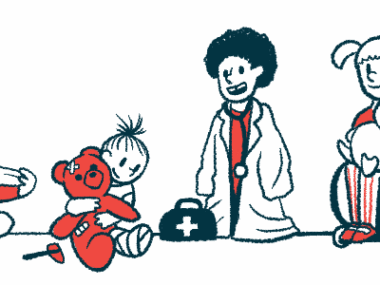Pitolisant Eases Daytime Sleepiness In Children, Adults With PWS: Top-Line Data
Study's main goal assessed therapy's effects on sleep issues after 11 weeks
Written by |

Daily treatment with oral pitolisant reduced excessive daytime sleepiness in children and adults with Prader-Willi syndrome (PWS), according to top-line data from a placebo-controlled Phase 2 clinical trial.
While the relatively small proof-of-concept study wasn’t powered to detect statistically significant differences, the observed improvements with pitolisant relative to a placebo were clinically meaningful.
“The positive signals observed on the primary outcome of [excessive daytime sleepiness] from this proof-of-concept study are encouraging,” Jeffrey M. Dayno, MD, chief medical officer at Harmony Biosciences, pitolisant’s developer in the U.S., said in a company press release. “We look forward to receiving the full data set from this initial signal detection study which will further inform our understanding of the data as we plan to advance our clinical development program for pitolisant in PWS.”
The trial’s full data set, expected by year’s end, will also include the results of secondary goals, such as changes in behavioral symptoms, cognitive function, and excessive hunger, as well as clinician- and caregiver-reported global impressions.
Harmony plans to present the full trial results at a future medical meeting and submit them for publication in a scientific journal.
PWS is a complex genetic disease with symptoms that include insatiable hunger, weak muscle tone, cognitive and behavioral problems, and distinct facial features. Many patients also have excessive sleepiness during the day.
Several clinical features result from an impairment of the hypothalamus, a brain region that controls hormone production and is involved in several important functions, such as hunger, growth, and sleep.
Originally developed by Bioprojet, pitolisant is an oral treatment thought to reduce sleepiness by increasing the release of a wakefulness-promoting molecule called histamine in the brain.
In 2017, Harmony acquired development and commercialization rights to pitolisant in the U.S., where it was later approved, under the brand name Wakix, for excessive daytime sleepiness or sudden loss of muscle tone in adults with narcolepsy, a chronic sleep disorder.
Pitolisant’s potential for PWS sleepiness
Given its potential to ease daytime sleepiness, Harmony is testing whether the therapy could also benefit people with PWS having sleeping problems.
The Phase 2 trial (NCT04257929), launched in 2020, enrolled 65 PWS patients, ages 6–65, with excessive daytime sleepiness who were randomly assigned to receive oral tablets of either a low or high dose of pitolisant, or a matching placebo, once daily for 11 weeks.
In the first three weeks, the dose was titrated, or increased, up to the final dose, followed by eight weeks of maintenance therapy. The exact target dose depended on whether participants were pediatric (6–11 years; 8.9 or 17.8 mg), adolescent (12–17 years; 13.35 or 26.7 mg), or adult (18 and over; 17.8 or 35.6 mg).
Earlier this year, the study protocol was adjusted to make it easier to participate. This included eliminating time-consuming sleep studies, allowing remote screening visits, and being more flexible about remote visits.
Overall, 91% of participants completed the 11-week treatment and all but one of these patients opted to enter the trial’s open-label extension period where all are receiving pitolisant for a longer period. It will be given at the maximum dose allowed for their age group, again after a three-week titration.
The study’s main goal was to assess the treatment’s effects on excessive daytime sleepiness after 11 weeks. This was measured with the caregiver-reported Epworth Sleepiness Scale for Children and Adolescents (ESS-CHAD; parent/caregiver version), with score range of 0–24 and lower scores reflecting less sleepiness during the day.
All age groups show gains with pitolisant
ESS-CHAD scores dropped by a mean of 3.7 to 5.5 points after treatment across all treatment and age groups, reflecting a clinically meaningful reduction in daytime sleepiness, defined as a two-point or greater reduction.
Pitolisant-treated children and adults saw a clinically meaningful difference (of at least two points) in daytime sleepiness relative to those given a placebo. This difference was driven largely by improvements seen among patients given the high-dose, Harmony noted.
However, the placebo response was three times greater for adolescent patients than the other two ages, resulting in no clinically meaningful differences between the pitolisant and placebo groups.
Overall, 70% of patients in the high-dose group, 55.6% in the low-dose group, and 52.6% in the placebo group were considered “responders.” This was defined as a reduction of at least three points on the ESS-CHAD or a total score of 10 or lower by the end of treatment.
Safety findings were consistent with pitolisant’s known safety profile. Treatment-related side effects were reported in 26% of patients on pitolisant and 30% on a placebo. A serious side effect was reported in a patient in the placebo group.
“We are pleased the results of this trial were clinically important and that Harmony intends to continue to study pitolisant in people with PWS, which may bring us one step closer to finding an important therapeutic advancement for a community with such limited treatment options,” Susan Hedstrom, executive director of the Foundation for Prader-Willi Research and Paige Rivard, CEO of Prader-Willi Syndrome Association USA, said in a joint statement.
“I want to thank our clinical investigators and their teams, who partnered with us in the conduct of this trial, as well as the patients with PWS and their families who participated in the trial, for whom we are grateful,” Dayno said.






